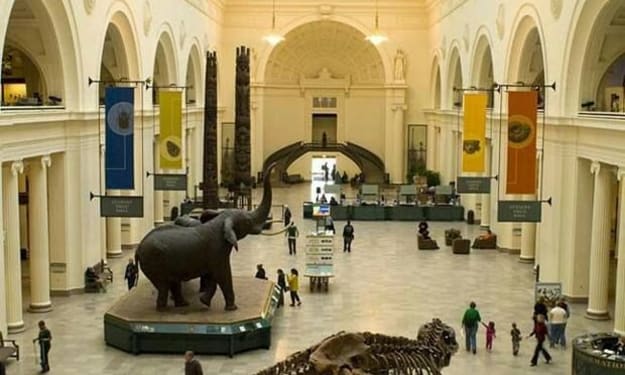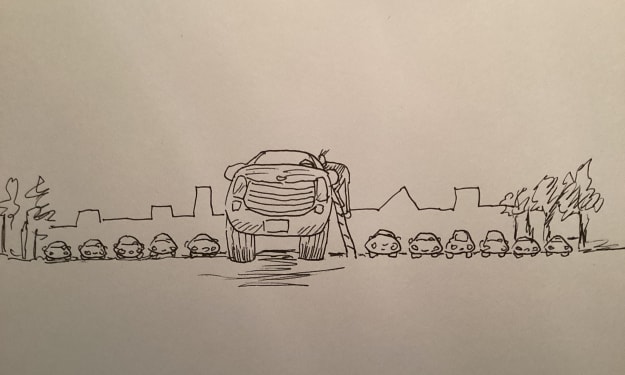A Crisis of Invisible Pollution: How Urban Noise Harms Nature
A Look at the Environmental and Health Consequences of Our Loud Industrial World
When you think of pollution, certain sights come to mind: beaches littered with plastic, greenish liquid pouring out from a pipe. These sorts of pollution get the most attention, they’re charismatically dramatic and often acutely heartbreaking. But, unfortunately, our effect on other creatures isn’t isolated to the chemicals and refuse we produce. On top of the sludge and fumes, we’re also profoundly noisy to our natural neighbors.
Noise pollution is the term for this sort of effect we cause on the environment. It refers to any sort of disturbing sound produced by any living or abiotic forces that excessively disrupt the well-being of creatures. Though it can be caused by weather and geological events, non-human animals, and other natural phenomena, our profound industrialization and development are starting to drown out the rest of the noise, especially in densely populated areas.
Read on to discover where noise pollution comes from, why it matters, and what we can do to improve our noisy impact on the non-human world.
Where Does Noise Pollution Come From?
As far as Earth’s species go, we’re one of the best at being loud. Most of what we do causes noise, but our industrialization in the last hundred years has rapidly and efficiently increased our ability to hog the auditory waves.
The biggest culprits for noise pollution will likely not come as a surprise: transportation, industry, and construction are notorious for being obnoxiously loud, even for us humans. Though they take up a good proportion of the sound, many other aspects of our daily life contribute to noise levels.
In urban areas, entertainment and recreation activities are responsible for a decent bit of noise - especially in spaces like concerts and sporting events where music is played loudly and folks are cheering. In addition, commercial establishments like bars, restaurants, and shopping centers often create a constant chatter, and a buzz of electronic machines and appliances.
In suburban neighborhoods, though certainly quieter than urban zones, household appliances, power tools, and electricity constantly hum. If you’ve ever been through a power outage, you’ve likely noticed how oddly quiet your environment has become. The modern human home is a place of constant background sounds.
How Does Noise Pollution Impact Wildlife?
Auditory communication is excessively important to animals, especially to birds, amphibians, and many mammals. To cope with humans’ rapid increase in noise production, many animals have already undergone a wide variety of behavioral changes. The changes thus far have altered communication, mating, foraging, and spatial orientation behaviors in many species across the planet. We’ve seen some remarkable adaptations to this noise increase but, unfortunately, not all species have been able to adapt as rapidly as our noise levels have changed. There’s also growing concern that too much noise pollution can alter predator-prey dynamics, disproportionately affecting animals that use sound to either detect prey or to avoid being caught by predators.
Loud human-caused noise doesn’t just affect animal behavior, however. Noise pollution has also been found to have actual physiological effects on wildlife. According to an article from the Florida Museum, high-noise environments have increased stress levels in several species, especially species of birds. The article reported that “researchers found that adults and nestlings of three species showed multiple signs of chronic stress caused by noise pollution, including skewed stress hormone levels, possibly due to increased anxiety, distraction and hypervigilance.”
Equally alarmingly, additional studies have found that noise pollution can also lead to hormonal imbalances and impaired immune systems. But the full extent to which noise pollution is harming creatures on our planet is not yet fully understood. It’s more than safe to assume that we will continue to uncover additional examples and ways in which noise pollution by humans is hurting non-humans.
On top of it all, these three types of effects build on each other in an awful positive feedback loop. As we continue to encroach on wild habitats, we subject more and more species to these effects. As the collection of species affected increases, we’ve started to see more startling trends: changes in predator-prey dynamics, habitat use, migration patterns, longevity, and general well-being.
Does Noise Pollution Impact Humans?
In case the effects of the natural world aren’t convincing enough for you, your loved ones, or anyone else you may be arguing with, there is a growing collection of research that is finding negative health effects from noise pollution on humans, too.
According to the EPA, as part of the message within the 1990 Clean Air Act, studies show “there are direct links between noise and health. Problems related to noise include stress-related illnesses, high blood pressure, speech interference, hearing loss, sleep disruption, and lost productivity. Noise Induced Hearing Loss (NIHL) is the most common and often discussed health effect, but research has shown that exposure to constant or high levels of noise can cause countless adverse health effects.”
Since the act, additional research has found a correlation between noise and increased levels of depression and anxiety, sleep disruption and increased insomnia, decreased ability to learn and remember, and even increased risk of heart attacks, strokes, and other heart health issues. Most alarmingly, this effect seems to be the most severe with children, who may see negative development effects and difficulty reading and listening.
How Can We Mitigate the Impact Our Noise Pollution Has on Wildlife and Us?
Most notably, we should consider implementing buffer zones between wilderness and civilization. Establishing buffer zones around sensitive habitats, such as national parks, reserves, and wildlife sanctuaries, can provide a shield against excessive noise. These designated areas can act as barriers, reducing the intrusion of human-generated noise and, as a result, preserving the natural acoustic environment for wildlife. As we continue developing and modifying our cities, we can emphasize the importance of this sort of noise pollution mitigation.
In addition to regulation and innovation, we can modify our cities, suburbs, and towns so that their design is more wildlife-friendly. Using materials that dampen noise, or modifying layouts so that loud machines or structures are contained can have a profound effect on how wildlife is affected by our habitats. We can also help by managing human activities. Regulating and managing human-caused noise in areas adjacent to wildlife habitats can help minimize noise pollution. Additionally, enforcing speed limits, restricting the use of motorized vehicles, and establishing quiet hours in specific areas can reduce noise levels and provide periods of respite for wildlife.
And, of course, we can continue improving public awareness and education around the issue. When communities become aware of the effects they’re having on the environments and species that they love, it’s more likely that they’ll make an effort to help it. And, it’s more likely that they’ll vote for civic policies that support it too!
–
By implementing these measures, we can work towards mitigating the impact of noise pollution on wildlife, creating a more harmonious environment where both human activities and the natural world can coexist sustainably. The impact of noise pollution on wildlife needs to be addressed. Our recent industrialization has rapidly changed what Earth sounds like and, for the sake of the species we share it with, we must mitigate the sounds our machines and we produce.
I urge you to share this information far and wide, educate those around you, and get noise pollution into the Zeitgeist of your community. Your ears and the creatures that inhabit it will thank you. It’s easier to listen when we’re all producing less noise.
About the Creator
Olivia L. Dobbs
Science Enthusiast, Naturalist, Dreamer, Nerd.
I crosspost my Medium articles here :)
You can find my main account on Medium: https://medium.com/@oliviadobbs13
Check out my science! -> bit.ly/DobbsEtAl
Enjoyed the story? Support the Creator.
Subscribe for free to receive all their stories in your feed. You could also pledge your support or give them a one-off tip, letting them know you appreciate their work.







Comments (1)
First time hearing about noise pollution! Great article!